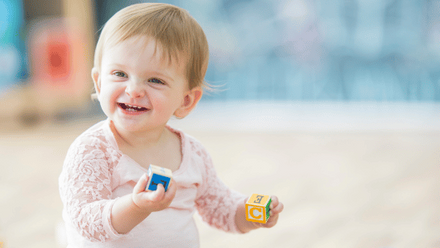How to develop strong networks with families starting at setting
For infants and young children, starting at an early education and care setting can be a mixed experience – some children thrive on the opportunity to explore a new place and meet new people, whilst other children might struggle with the transition into unfamiliar territory without their grown-ups from home.
Regardless of how a child approaches the transition to out-of-home care, the process is one that impacts the entire family and is often an overlooked part of the experience, where the priority is to ensure safety and security for the children involved.
This learning workout reflects instead on the experiences of the parents and carers who are also adjusting to the start of their child’s journey in early education and care.
Genuine and adaptive relationships with families is the golden thread through everything we do as early education and care professionals. The home learning environment has the biggest influence on a child’s social emotional development and cognitive learning, so it's well established that promoting healthy relationships with parents and carers and a supportive environment for families is of the highest importance for sustaining quality interactions both in and out of setting.
This relationship begins the moment a family enquire into a place for their child, the minute they enter through the door for a tour, the day they come to their first settle session, that first check-in call on their child’s first day. Every action counts towards making the transition to a new setting one that provides security and reassurance for the child… but also for the parents and carers.
Making initial steps towards a strong partnership with families
A smile goes a long way
- Start your first meeting with a positive attitude that means to go on. Be sure to introduce yourself and the team, as well as the nursery’s values and practices.
- Show genuine interest by asking questions about the family experiences and background. Take on board what parents and carers have to say, thinking about how these values can be implemented into practice for the child’s experiences. For example, if a parent or carer mentions that they live in a flat, it might be useful to think about opportunities to utilise the garden space often. If they mention that a relative works with animals, it could be useful to think about opportunities that extend on this real-life experience and knowledge for more learning opportunities.
Make your engagement personal
- Handovers are a great way to hold regular informal check-ins with parents and carers to discuss their child’s initial settling-in, address any immediate concerns and gather feedback.
- Share experiences in ways that reassure families about their child’s time at the setting. This does not mean lying or ignoring difficult interactions throughout the day, but instead highlighting the positive attributes and progress made. For example, a baby who is struggling to eat in a new environment but tries a new food or approaches the lunch table to have a snack should be praised and recognised for this achievement, rather than focusing on the lack of a full meal.
Keep communication as regular as possible
- It can be a daunting time for parents and carers to be away from their little ones, quite possibly for the first time. Take that extra time to send photos, make quick phone calls and update with information about their day, such as the activities the children have been involved in or their routine care news.
- Different families engage in different ways. Adapt your communication style to suit individual family preferences, whether they prefer face-to-face discussions, phone calls or digital messages.
- An open-door policy that is established early is helpful for setting expectations and encouraging parents and carers to visit the nursery, ask questions and communicate any concerns or suggestions in a collaborative way that works with the setting towards change.
Introduce the curriculum and significance of early years early on
- For families who are unfamiliar with the wider world of early education and care, a formal setting can be a foreign territory filled with baffling terms that differ across areas and countries (Scotland and Wales, for example) and complex policies. It's important to make sure parents and carers are fully aware of their responsibilities when it comes to agreeing to policies, so make sure to confirm their understanding and give them ample opportunities to ask questions. It's always a good idea to provide them with a copy they can use to refer back to and to ensure this is resent when updates are made.
- Understanding the curriculum values and learning opportunities within the setting can also be a challenge for those who have not experienced it before. When starting, it can be helpful to prepare a short guide to the setting’s curriculum and ethos to give them a well-rounded overview of the learning intentions. When it comes to specific activities, be sure to highlight the learning opportunities gained through play to help parents and carers to see the valuable opportunities for learning and appreciate their child’s magical development day by day.
Conclusions
Having an insight into the parents’ and carers’ experiences is enormously helpful for thinking about how best to support parent and carer partnerships initially to create foundations for a long-lasting relationship with families as their children grow through setting.
Want to know more? Take a look at NDNA’s parent and carer resources to support families with the decisions and emotions that come with children starting at a setting.






